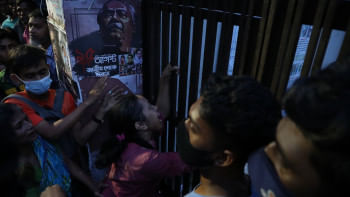How many years must Jonny’s family wait?

For the past 10 years, we have been remembering Ishtiaque Hossain Jonny, an innocent individual who was tortured to death in police custody, in the hopes of inching towards justice. Every year, we bring up Jonny's ordeal—how he was targeted, picked up and assaulted, all because he spoke up against wrongdoing. Unfortunately, we may have to do the same next year, as the High Court is yet to start hearing the appeals due to the lack of a paper book, which contains all case details necessary to hear and dispose of an appeal. It is this small requirement that is keeping Jonny's family in despair.
On February 8, 2014, around 25 police officers raided a house during a wedding ceremony at Pallabi's Irani camp in Dhaka and picked up Jonny, a 28-year-old garment waste trader, and his brother. What was Jonny's crime? He reportedly slapped a police informant for stalking and harassing women at the programme. This "crime" led to the custodial torture of two brothers, and at one point, Jonny could not bear it anymore.
On September 9, 2020, a Dhaka court sentenced three former officers of Pallabi police station to life imprisonment, and two others to seven years in jail. While this was good news, this verdict remains only on paper until appeals are heard and the ultimate judgment is handed down, which is being delayed as the defence has not prepared the paper book. Meanwhile, Jonny's family is yet to get the Tk 6 lakh compensation from the convicted, as the High Court issued a stay order on this in 2021. Such is the nature of our legal system, in which victims have to wait years and decades to get justice.
While remembering Jonny, let us also recall the countless other victims of this barbarity. Last year, Sultana Jasmine, a land office employee in Naogaon, died in Rab's custody at Rajshahi Medical College Hospital. A year before, Sumon Sheik, a 25-year-old deliveryman, died inside the lockup of Dhaka's Hatirjheel police station. In 2020, the custodial death of Rayhan Ahmed of Sylhet city made headlines. He was tortured at Bandarbazar police outpost and died on the same day. All these incidents point to the fact that custodial torture is deeply entrenched in our law enforcement agencies.
Although the Torture and Custodial Death (Prevention) Act exists, many refrain from filing cases under it, fearing that antagonising law enforcers would entail harm, say experts. This fear is not unnatural, since time and again, we have seen how hostile officers can get in their efforts to protect their own. Therefore, we urge nothing but reform—of how law enforcers are chosen for the job, of the way civilians are handled, of our custodial practices, and of how officers are held to account—lest we see years of more torture, deaths and injustice.


 For all latest news, follow The Daily Star's Google News channel.
For all latest news, follow The Daily Star's Google News channel. 










Comments